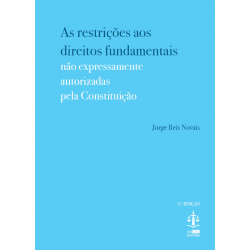



 SAFE PAYMENT
SAFE PAYMENT
Secure payments directly managed by banks. ATM, MBWay and Paypal available.
 FREE SHIPPING FROM 25€
FREE SHIPPING FROM 25€
Deliveries in 2 to 3 business days (except holiday period).
 CUSTOMER SUPPORT
CUSTOMER SUPPORT
We are available to clarify all your doubts.
ÍNDICE GERAL
INTRODUÇÃO
PARTE I - RESTRIÇÕES AOS DIREITOS FUNDAMENTAIS
CAPÍTULO I - CONCEITO E TIPOS DE DIREITOS FUNDAMENTAIS
1. Razão de ordem
2. Direito fundamental e norma de direito fundamental
3. Dimensão objectiva e dimensão subjectiva dos direitos fundamentais
3.1. Dimensão objectiva dos direitos fundamentais
3.1.1. O efeito de irradiação dos direitos fundamentais
3.1 .2. O dever estatal de protecção
3.2. Dimensão subjectiva dos direitos fundamentais
3.2.1. Direito fundamental, judiciabilidade e direito subjectivo público
4. Tipos de direitos fundamentais
4.1. Direitos de liberdade e direitos sociais
4.2 A Constituição portuguesa e a distinção marcante entre direitos, liberdades e garantias e direitos económicos, sociais e culturais
CAPÍTULO II - CONCEITO E TIPOS DE RESTRIÇÕES AOS DIREITOS FUNDAMENTAIS
1. Razão de ordem
2. Constituição, direitos fundamentais e lei
3. Restrições aos direitos fundamentais e conceitos afins
4. Restrições aos direitos fundamentais em sentido lato e em sentido estrito
4.1. O conceito de intervenção restritiva
4.2. O conceito de restrição em sentido estrito
5. Conceito de restrição adaptado para fins de delimitação do objecto da investigação
6. Tipos de restrições aos direitos fundamentais
6.1. Sistema diferenciado de reservas constitucionais e tipos de restrições
PARTE II - AS RESTRIÇÕES NÃO EXPRESSAMENTE AUTORIZADAS ENQUANTO PROBLEMA CONSTITUCIONAL
CAPÍTULO III - A FUNDAMENTAÇÃO DAS RESTRIÇÕES AOS DIREITOS FUNDAMENTAIS
1. O paradoxo da existência de restrições aos direitos fundamentais e os modelos propostos para a sua explicação
2. O "pensamento de intervenção e limites" ou teoria externa dos limites aos direitos fundamentais
3. A teoria interna dos limites dos direitos fundamentais
4 O modelo dos direitos fundamentais enquanto princípios
5. Conclusão
CAPÍTULO IV - AS RESTRIÇÕES NÃO EXPRESSAMENTE AUTORIZADAS - MODELOS DE SOLUÇÃO
1. Razão de ordem
2. A rejeição absoluta de limitações não expressamente autorizadas pela Constituição
2.1. A concorrência de direitos fundamentais com limites divergentes
3. A admissibilidade de limites não expressamente autorizados na qualidade de (de)limitação a priori dos direitos fundamentais
3.1. Concepção restritiva da previsão normativa dos direitos fundamentais
3.2. Doutrina dos limites imanentes dos direitos fundamentais
3.2.1. A cláusula de comunidade
3.2.2. Os direitos dos outros
3.2.3. Os limites contidos nas leis gerais
3.2.4. A ordem pública ou a cláusula geral de polícia
3.2.5. O abuso do direito
3.2.6. As relações especiais de poder
3.2.7. O art. 29º, nº 2, da Declaração Universal dos Direitos do Homem
3.2.8. Conclusão
4. Admissibilidade de restrições não expressamente previstas: a doutrina das restrições implicitamente autorizadas pela necessidade de solucionar colisões entre bens constitucionais
CAPÍTULO V - AS RESTRIÇÕES NÃO EXPRESSAMENTE AUTORIZADAS - POSIÇÃO ADOPTADA
1. Os direitos fundamentais enquanto garantias jurídicas com reserva geral imanente de ponderação
1.1. A proibição constante do art. 18º, nº 2, da Constituição e a relevância jurídica do sistema constitucional de reserva
2. Direitos fundamentais como trunfos e bens susceptíveis de fundamentar uma restrição não expressamente autorizado
3. O controlo da constitucionalidade das restrições aos direitos fundamentais ou o problema dos limites aos limites dos direitos fundamentais
PARTE III - CONTROLO DA CONSTITUCIONALIDADE DAS RESTRIÇÕES NÃO EXPRESSAMENTE AUTORIZADAS
CAPÍTULO VI - A PONDERAÇÃO DE BENS ENQUANTO METODOLOGIA CONSTITUCIONALMENTE ADEQUADA
1. Razão de ordem
2. A discussão norte-americana
2.1. Categorization, definitional balancing e ad hoc balancing
3. A discussão germânica
4. A ponderação de bens enquanto metodologia constitucionalmente adequada - posição adoptada
CAPÍTULO VII - PONDERAÇÃO DE BENS E LIMITES AOS LIMITES DOS DIREITOS FUNDAMENTAIS
1 . Razão de ordem
2. Princípio da proibição do excesso
2.1. Fundamentação e sentido
2.2. Princípio da idoneidade ou da aptidão
2.3. Princípio da indispensabilidade ou do meio menos restritivo
2.4. Princípio da proporcionalidade
2.5. Princípio da razoabilidade
2.6. Princípio da determinabilidade (na dimensão de proibição do excesso)
2.7. A garantia do conteúdo essencial
3. Princípio da igualdade
3.1. A exigência de generalidade e abstracção das leis restritivas
4. Princípio da protecção da confiança
4.1. A proibição de retroactividade das leis restritivas
5. Princípio da reserva de lei (remissão)
CAPÍTULO VIII - RACIONALIZAÇÃO DA PONDERAÇÃO DE BENS E QUESTÕES DE COMPETÊNCIA
1. Legislador e Administração
1.1. A reserva de lei - fundamentos e actualidade do princípio
1.2. A determinabilidade ou densidade normativa (na dimensão competencial)
1.3. Legislação e administração
1.4. Assembleia da República e Governo
2. Legislador e Juiz.
3. Ponderação de bens e standardização dos procedimentos e parâmetros de controlo na experiência constitucional norte-americana
3 .1. Categorization, rules e standards no controlo das restrições aos direitos fundamentais
3.2. Standards ou tests de controlo das restrições
3.2.1. Restrições em função do conteúdo e clear and present danger
3.2.2. Restrições neutrais
3.3. Texas v. Johnson: a controvérsia sobre aflag-burning ou a ocasião para testar os tests
NOTAS FINAIS